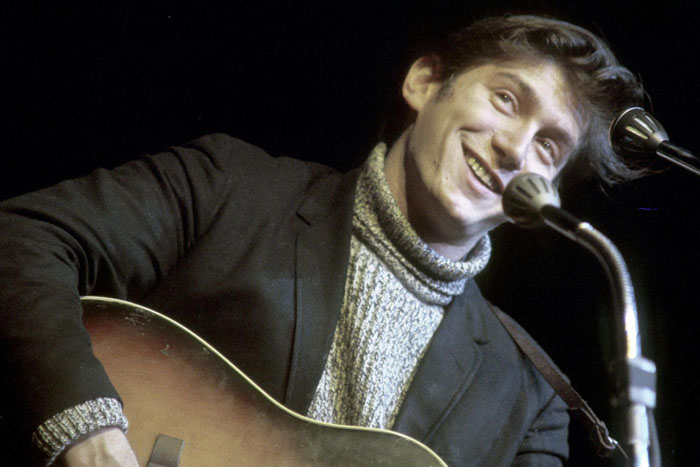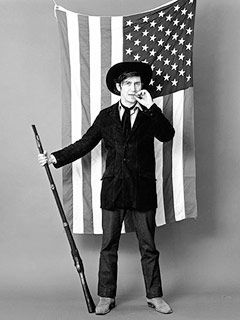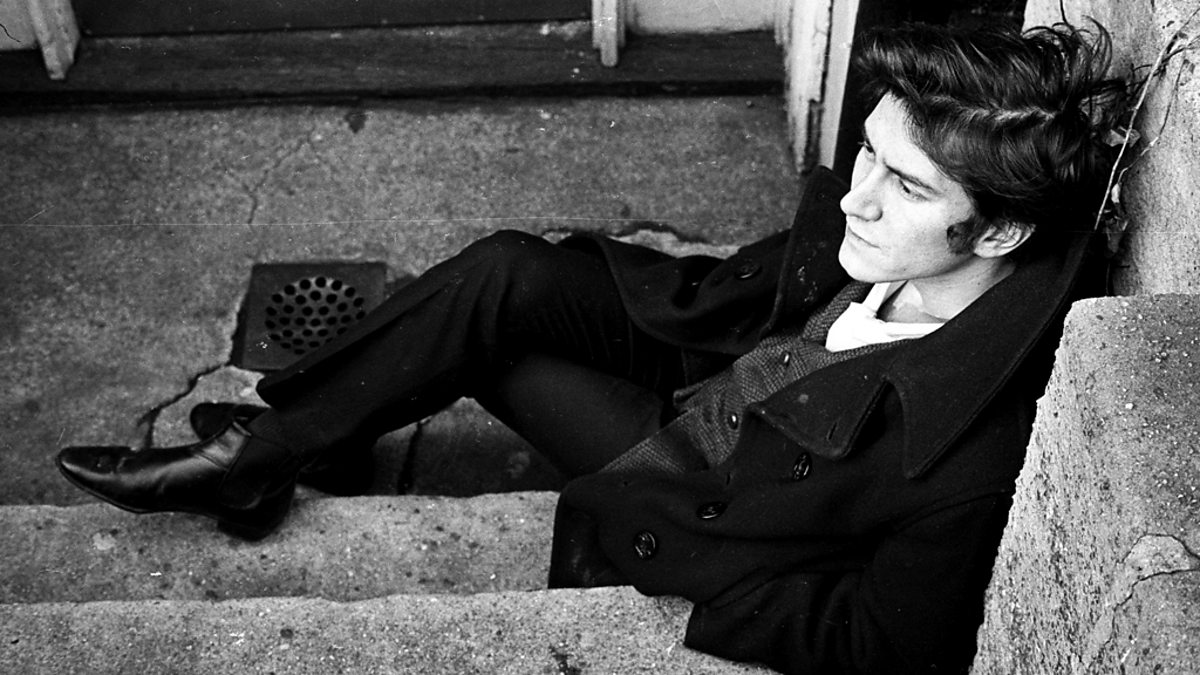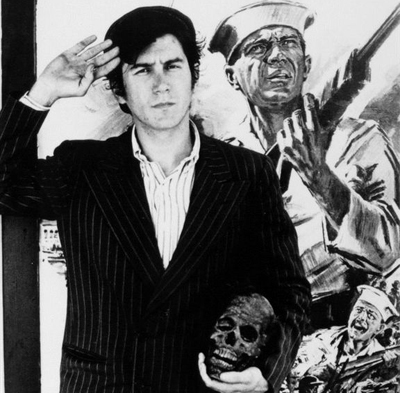Okay, the title is a bit of an exaggeration. He certainly isn’t forgotten. Give me a break, I came up with the title for this over two years ago.
I’m talking about Phil Ochs, of course. His legacy is a bit strange. Personally, he is almost certainly my favorite folk musician. A lot of people agree with me and consider themselves diehard Ochs devotees. On the other end of the spectrum, a whole lot of people have never heard of him. I remember analyzing one of his songs for a media class in high school and nobody else in the class seemed to know him. His popularity pales in appearance to those such as Bob Dylan and Pete Seeger. So how can someone be, simultaneously, semi-obscure and one of the most beloved and influential folk musicians out there? Well, I guess it’s pretty simple. If you’re into folk music, you certainly know him, but if you’re not, you probably don’t. And yet the situation still…perplexes me. Many articles about him include “forgotten”, “obscure”, etc in the title. So let’s reflect on his legacy a bit.

Phil Ochs had a very intense, sad life. He didn’t grow up praying every day that he would become a musician and/or political activist. He moved around frequently and his father was distant, dealing with mental illness after serving in the military. Before he was a guitarist, he played the clarinet. He was very talented at it too–his teachers seemingly gave him endless praise, and he became Capital University Conservatory of Music’s principal soloist before he even turned 16. That’s a college. That’s crazy. He also liked rock and roll music as well as country music, and these would be a huge influence on his later career.
His political beginnings took place when he was in college. While spending two weeks in jail at age 18 for sleeping on a park bench, he decided he wanted to become a journalist, and in his studies, he found himself immersed in the world of leftist politics. Indeed, Ohio State University was where he really started to blossom. While he was becoming interested in his potential journalism career, he also discovered the world of folk music and learned to play the guitar, both introduced to him by Jim Glover. Ochs was growing into himself, and thus his protest songs were born (or, as he called them, “topical songs”).

Right before he graduated, Ochs dropped out of Ohio State and moved to New York, where all folk singers around that time (1962) seemed to go. One thing that made him stand out a bit was his background in journalism. He would get ideas for his songs by reading the newspaper, and he even referred to himself as a “singing journalist”. The most famous moment of his tumultuous friendship with Bob Dylan was Dylan kicking him out of his (Dylan’s) car, saying that he (Ochs) was a journalist, not a folk singer. Ochs rose to the top of the booming NYC folk scene, and in 1964, he released his first record: All the News That’s Fit to Sing (of course, another reference to his journalist roots). It was a very simple folk record, through and through. Here are the credits as they’re listed on Wikipedia:
-Phil Ochs: first guitar, vocals
-Danny Kalb: second guitar
-John Sebastian: harmonica on “Bound For Glory” (uncredited)
That’s all. No frills.

This record is some of the most pure Ochs that exists. When people think of him, this is what they remember. Him, his guitar, and some leftist values so strong that he was already considered to be a threat by the FBI and would remain that way the rest of his life. “Vietnam Talking Blues”, also known as “Talkin’ Vietnam”, was the first protest song to mention Vietnam by name. “Power and the Glory” remains one of his most famous tracks. He apparently told his sister Sonny that it was the greatest song he would ever write, but that’s just the tip of the iceberg in terms of his greatest songs.
Ochs released another record in 1965 and then another in 1966: I Ain’t Marching Any More and Phil Ochs in Concert, which, despite its title, is only partially live. Critics and fans alike thought he was getting better and better with each record. These records were equally simplistic as the first one. I Ain’t Marching Any More contained the gut-wrenching title track (one of my favorite songs of his) and the satirical “Draft Dodger Rag”, while Phil Ochs in Concert introduced the world to “There But For Fortune” (yes, he wrote that song, not Joan Baez), “Changes”, “When I’m Gone”, and, best of all, “Love Me, I’m a Liberal”, which demonstrates the difference between leftist and liberal values. Phil Ochs in Concert in particular contains some of my favorite Ochs songs, such as “I’m Going to Say It Now”, a biting threat about the youth rising up and speaking out, and “Cops of the World”, a pretty standard critique of the police. All in all, Ochs was playing his guitar and speaking out against racism, fascism, and oppression. But soon, a turning point would come in his music.

1967 was a pretty busy year for Ochs, as he switched record labels and moved out to LA. He performed at countless rallies and organized a few himself, angry with the US’s involvement in Vietnam. He also released a record that was a bit different: Pleasures of the Harbor. Naturally, some weren’t happy with the new direction, but I think it aged extremely well. In fact, this is one of my favorite Ochs records. He included a more varied instrumentation, such as Dixieland-style piano and cinematic strings. Also, out of the eight songs on the record, only two are under five minutes (“Cross My Heart”, “Outside of a Small Circle of Friends”), with THREE of them being over EIGHT minutes (“I’ve Had Her”, “Pleasures of the Harbor”, “Crucifixion”), not including one that clocks in at 7:57 (“The Party”). The subject matter also expanded a bit. While the record is still littered with political statements, “The Party” details, well, a snobbish party, and “Pleasures of the Harbor” is the lament of a lonely sailor. The whole thing seems much more personal than the folk journalism of his previous three records. It did not produce any hits, but “Outside of a Small Circle of Friends”, a jaunty piano tune about witnessing a murder and not intervening, remains one of his best known songs. Also, Warren Zevon played guitar on the title track, which is an interesting fact.
Ochs didn’t slow down in 1968, largely because the world of politics was exploding at the time. MLK being assassinated, the police riot in Chicago, Nixon getting elected…it was all very upsetting to Ochs, which was perhaps the start of his downward spiral. But we’ll get to that. He was also involved with the creation of the Youth International Party (the Yippies) around this time. Ochs was, at one point, arrested because of his actions with the Yippies (it involved “nominating” a literal pig for the Democratic presidential candidate) and witnessed a lot of violence around the time of the Chicago police riots. That year, Ochs released Tape From California, a record that followed the path of Pleasures of the Harbor with more cinematic arrangements and some long, dramatic songs (“When in Rome” being over 13 minutes!). It’s best remembered for “The War is Over”, but is often unfairly glossed over when discussing Och’s discography, in my opinion. Although, to be fair, I don’t have much to add about it either.
After the political turmoil of 1968, Ochs was feeling horribly defeated. Thus, his next record, from 1969, was called Rehearsals For Retirement, and the cover featured a photo of a tombstone stating that he died in Chicago the previous year. This record, once again, is similar to the previous two, but this is probably the darkest record Ochs ever made, and also very possibly my favorite. “Another Age” desperately rejects the election of Nixon, “I Kill Therefore I Am” once again attacks the police, and “William Butler Yeats Visits Lincoln Park and Escapes Unscathed” discusses the aforementioned riots. However, some of the songs once again lean more personal. “Pretty Smart on My Part” has a feeling of the paranoia that would plague the rest of Ochs’s life, which also continues into the intense “My Life”, a song that declares how his previously wonderful life has turned unbearable. While his music was never sunshine and rainbows, this was a marked difference from his often at least slightly optimistic songs, such as “Cross My Heart” and “That’s the Way It’s Gonna Be”.
Unfortunately, in the 70s, Ochs started to pretty rapidly decline. His final studio album was released in 1970. Despite being titled Greatest Hits, it was entirely new material, but it was unlike anything else he ever made. Frustrated, he felt that he needed to take a new direction in order to get the average American to listen to his political ideas. He decided to draw from the music he liked as a teenager–rock ‘n’ roll and country. It was…different. None of these songs are very well remembered now, except maybe “Chords of Fame”. He started wearing a gold lamé suit and peppering his setlists with covers of Buddy Holly and the like. He stated that he died in Chicago and chose to reincarnate as Elvis. If including different instruments in his songs was controversial, you can imagine how fans felt about this. One of these shows, marked by a bomb threat causing the night to end early, was released as a live record, 1975’s Gunfight at Carnegie Hall. The response to these changes was very discouraging to Ochs, which is (as far as I know) the reason why he recorded no further records, despite previously releasing one every single year. To be fair, he was also starting to take a dive, mental health wise. While touring, he began to drink heavily and became reliant on Valium to calm his nerves. The Valium dependency did improve, but for the rest of Ochs’s life, he was depressed and an alcoholic.

Ochs took up traveling in this time, sometimes to his detriment. He cut short a trip to Peru out of fear of arrest, and, more famously, he was physically attacked in Tanzania, damaging his vocal cords. He also continued to perform and campaign for anti-war politicians. He even almost went on a co-headlining tour with Bob Dylan, but sadly that fell through. It went way downhill after that. The last few years of his life were hell, and despite his friends and family trying to help him, nothing worked. He was, eventually, diagnosed with bipolar disorder, and he spent most of his time drinking. He was extremely paranoid and would ramble on and on about the FBI and CIA, carrying weapons with him in case of an attack. Unfortunately, he was actually correct about this. The government had hundreds of pages documenting him as a person to be watched, although the records were sloppy, even spelling his name wrong much of the time. This mental health crisis culminated in Ochs taking on a new identity, John Train. He said that John Train killed Ochs and replaced him. Thankfully, Ochs returned to himself months later, but the damage was done. He was homeless and his life was in pieces. In 1976, he moved in with his sister Sonny, but he didn’t do much of anything at all during this time. Despite so many people trying to get him help, Phil Ochs died by suicide three months later on April 9, 1976. He was 35.

Even with his tragic life being cut so short, Phil Ochs had a profound effect on the world of music. His songs are still cherished today, and the political messages resonate just as strongly as they did nearly 60 years ago. He created some of the best music I’ve heard, and he was exceptionally clever, witty, and talented. I wish he had lived in a time with better mental health care. He had so much passion for improving the world and he deserved a happy ending to his story. If you have never listened to Phil Ochs, I urge you to give him a try. I never want to stop talking about him until he is on the same level as folk music’s household names. His beautiful songs will never be forgotten. Long live Phil Ochs.
Leave a comment